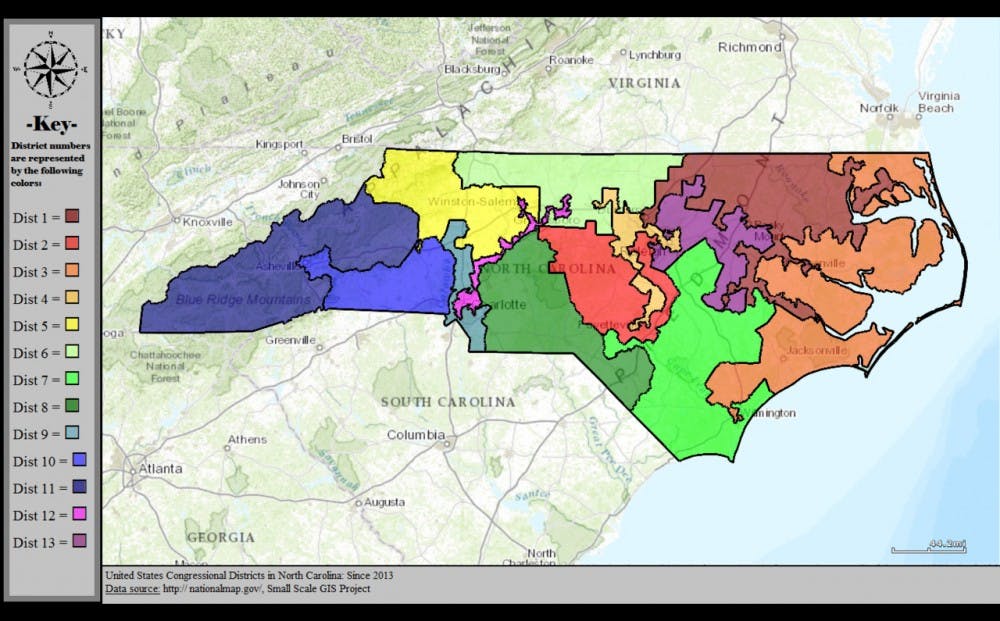In a state in which both sides claim the other has threatened the institution of democracy with gerrymandering, a Duke professor suggests that there’s a better way out.
A federal court-appointed Stanford professor submitted “improved” election map proposals Dec. 1 to fix unconstitutional racial gerrymandering in North Carolina, drawing ire from Republican state legislators. John Aldrich, Pfizer-Pratt University professor of political science, explained that switching to bipartisan or nonpartisan election commissions to draw the maps is necessary to maintain public trust.
“The biggest thing is that [gerrymandering] makes people more distrusting of politicians, and it drives them away from the process, so it’s harmful,” he said. “It seems so evidently narrowly self-interested and disgusting.”
The United States Supreme Court ruled in June that 28 state legislative districts were racially gerrymandered, in violation of the United States Constitution. The state legislature approved new district lines in August, which were criticized by Duke professors and subsequently rejected by federal judges.
Nathaniel Persily, James B. McClatchy professor of law at Stanford University, was appointed by U.S. District Judges Catherine Eagles and Thomas Schroeder, as well as Circuit Judge James Wynn, to redraw a number of districts in October.
But the new plan has received criticism from Republicans, including Representative David Lewis and Senator Ralph Hise—chairmen of the redistricting committees—who ripped it as a partisan power grab.
"By making many changes Democrats demanded, Mr. Persily has confirmed our worst suspicions: this entire ‘judicial process’ is little more than a thinly-veiled political operation where unelected judges, legislating from the bench, strip North Carolinians of their constitutional right to self-governance by appointing a left-wing California professor to draw districts handing Democrats control of legislative seats they couldn’t win at the ballot box,” Lewis and Hise wrote in a joint statement.
In their statement, Lewis and Hise cited a News and Observer opinion column which found that the new maps "made it easier for Democrats to defeat Republican incumbents" in six races.
Specifically, it would give Democrats an edge in four House votes in Mecklenburg and Wake Counties and in two Senate elections in Cumberland and Guilford counties, according to the column.
Aldrich said that Persily's plan was a step in the right direction, noting that partisan plans are generally biased.
“Whenever politicians are in charge of how they’re going to get themselves elected, it’s always partisan and self-interested,” Aldrich said. “It’s just a clean measure of how much difference it makes to be in charge of the of drawing the lines as compared to not. And the Republicans are in charge.”
In response to this, Aldrich advocated for a nonpartisan or bipartisan electoral commission to draw the lines, and then allowing the legislature a chance to vote up or down on proposed plans.
“Democrats could choose to do this, because they are in charge of it,” Aldrich said. “This is done in a lot of states and is oftentimes when there is split control. They always find some way to find some bipartisan consensus and split control.”
Thirteen states, ranging from California to Montana to New Jersey, have implemented either a nonpartisan or bipartisan election commission in order to work on redistricting.
“There’s lot of experience trying out various ways of formulating these commissions,” Aldrich said. “No set of people can simply design the perfect plan, but they can be less egregious than the ones that are currently adopted by most legislatures that are controlled by a single party.”
The debate in North Carolina could also be influenced by the Supreme Court's recent decision to hear a case on redistricting and First Amendment rights in Maryland. The seven Republican voters who brought fourth the case have argued that the state's 2011 redistricting plan was in retaliation to Republican voters in the 6th Congressional District—a potential violation of free speech and conduct.
In an interview with The Chronicle, Durham's new mayor Steve Schewel agreed with Aldrich that the plan Persily proposed was an improvement. He further slammed the gerrymandering that gave Republicans a big advantage in the state in the 2016 elections, saying that democracy in the state was “under attack” from the GOP.
“[Persily] had a fairly narrow mandate from the courts, and within that narrow mandate, he did a great job,” Schewel said. “It reduces the gerrymandering somewhat, but the effects of the gerrymandering are still going to be very powerful.”
Get The Chronicle straight to your inbox
Signup for our weekly newsletter. Cancel at any time.

Managing Editor 2018-19, 2019-2020 Features & Investigations Editor
A member of the class of 2020 hailing from San Mateo, Calif., Ben is The Chronicle's Towerview Editor and Investigations Editor. Outside of the Chronicle, he is a public policy major working towards a journalism certificate, has interned at the Tampa Bay Times and NBC News and frequents Pitchforks.

